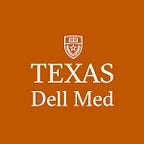Reimagining the Business of Health Care
In the heart of Austin, six blocks separate the University of Texas’ Dell Medical School from the McCombs School of Business. The figurative distance between the schools is much shorter, with administrators and faculty on both sides committed to being partners.
For the medical school, it’s about transforming an industry that’s decades behind others — think banks or automakers — in areas like efficiency, cost-control and customer service. “We’re working to create practical new business models for health care, and we need a collaborative partnership to figure out how to do that,” says Dell Med Dean Clay Johnston, MD, PhD. “We hope for tremendous leadership from McCombs.”
It’s no stretch for the business school. For nearly a decade, it has been beefing up its offerings to prepare graduates to work at existing health and biomedical companies — and to start their own. In 2009, the late Reuben McDaniel Jr., EdD, launched the McCombs Health Care Initiative to bridge ongoing work in nursing, social work, pharmacy, public health, natural sciences and other fields. “Essentially, what we did was create an invisible college of healthcare delivery here at the business school,” says Edward Anderson, PhD, professor of Information, Risk and Operations Management (IROM) and current director of the initiative, now called Healthcare@McCombs. “We bring together people from all those parts of the university that train people in various aspects of health care but are scattered throughout various units.”
In addition to a Business of Healthcare Certificate open to undergraduates enrolled in any major and an option for a concentration in health care as part of its MBA program, McCombs partnered with the University of Texas Medical Branch at Galveston to offer a 15-week biomedical innovation course that turns biotech researchers into entrepreneurs. It’s like a condensed version of McCombs’ Master of Science in Technology Commercialization program, and attracts participants from all over Texas.
McCombs is also making an impact in care delivery. Patients encounter shorter wait times at the University of Texas Health Science Center at San Antonio’s outpatient surgery clinic, where a team led by IROM Professor Douglas Morrice, PhD, identified bottlenecks — delays caused by incomplete or missing test results and other data. The clinic created a new nurse navigator position to address the problems. Eight months later, the facility was seeing 19 percent more patients, while decreasing its average clinic time by 9 percent.
The Dell Med Effect
With the advent of Dell Med, leaders of both schools see more doors opening. “We have already started working with the medical school in the areas of design, surgery and innovation,” says McCombs Dean Jay Hartzell, PhD. “We are in the process of developing specific research collaborations with the Department of Surgery and Perioperative Care, and have begun to discuss curriculum development with Dell Med’s health product innovation team. Going forward, we are excited about the prospect of creating innovative new executive education and graduate courses — and perhaps even a degree — in conjunction with the medical school.”
Faculty with one foot in each school is another step in the partnership. One such hire is Elizabeth Teisberg, PhD, a former professor at the University of Virginia Darden School of Business, Harvard Business School and the Geisel School of Medicine at Dartmouth.
Teisberg, who holds joint faculty appointments with both McCombs and Dell Med, is nationally recognized for the concept of value-based health care: making patients healthier at lower cost by organizing services around the needs of patients rather than doctors. She’ll be directing a value-focused institute based in both schools with goals focused on person-centered results measurement and integrating diverse specialties into unified care teams.
“Business offers powerful insight into measuring and improving results; health care needs that dynamic,” says Teisberg. “Working to create bridges between disciplines will help us take advantage of the strengths of the entire academic community.”
Dallas Morning News: How to Avoid Unnecessary Medical Treatments That Can Harm Patients
Anderson, the leader of the Healthcare@McCombs initiative, looks ahead to lifting both schools to new levels. “We in the business world can’t create substantive change in healthcare delivery without medical collaborators,” he says. “And a medical school can’t revolutionize health care without business school partners. To just have one or the other looking at healthcare delivery is sort of like the sound of one hand clapping.”
Besides, there’s the satisfaction of helping people in life-changing and life-saving ways. “You have the real potential to make people’s lives better,” says Healthcare@McCombs program coordinator Roanna Flowers. “Because whether we work in health care or not, we’re all patients.”
This excerpt is adapted from “Reimagining the Business of Health Care,” a story written by Steve Brooks that appeared in the fall 2016 edition of McCombs, a semiannual magazine published by the McCombs School of Business at The University of Texas.
